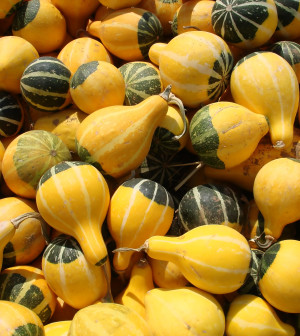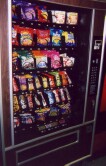- Could Your Grocery Store Meat Be Causing Recurring UTIs?
- Are You Making This Expensive Thermostat Error This Winter?
- Recognizing the Signs of Hypothyroidism
- 10 Strategies to Overcome Insomnia
- Could Artificial Sweeteners Be Aging the Brain Faster?
- Techniques for Soothing Your Nervous System
- Does the Water in Your House Smell Funny? Here’s Why
- Can a Daily Dose of Apple Cider Vinegar Actually Aid Weight Loss?
- 6 Health Beverages That Can Actually Spike Your Blood Sugar
- Treatment Options for Social Anxiety Disorder
Junk Food Cravings Linked to Brain Lapse


Can’t resist that fat-filled goodie? You can blame it on a brain lapse.
Giving in to cravings for high-calorie junk food is associated with a lapse in the part of the brain involved in self-restraint, Canadian researchers report in a new study.
The dorsolateral prefrontal cortex helps people control their own behavior, according to the study. Previous studies have shown that increasing activity in this part of the brain can cut cravings for unhealthy foods, but the new research found that reduced activity has the opposite effect and can lead to overindulgence in junk food.
“It has long been thought that the dorsolateral prefrontal cortex helps to keep automatic, or knee-jerk, reactions in check,” study senior author Peter Hall, from the University of Waterloo in Ontario, Canada, explained in a news release. “We discovered that when you temporarily dampen the operation of this particular part of the brain, strongly ingrained and quite universal preferences for high-calorie foods start to hijack people’s thought patterns and even their eating patterns.”
Using a form of magnetic stimulation of the brain, the researchers temporarily reduced activity in the left dorsolateral cortex of participants’ brains.
The study, published recently in Psychosomatic Medicine: Journal of Biobehavioral Medicine, revealed that the lowered activity caused greater food cravings for calorie-dense foods as well as greater intake of junk food.
“This is the first study to demonstrate that taking the prefrontal cortex temporarily offline results in increased snacking,” study author Cassandra Lowe, doctoral student in the university’s School of Public Health and Health Systems, said in a news release.
The researchers concluded their findings suggest brain health should be an integral part of public health campaigns.
“The research suggests that the best solution to effective self-restraint lies in maximizing brain health,” said Hall. “Interventions aimed at enhancing or preserving dorsolateral cortex function in healthy populations may reduce the likelihood of obesity and other chronic conditions.”
The healthy habits, he noted, include aerobic exercise, limited alcohol and adequate sleep.
“In the end, if you want to improve your self-control when it comes to snacking, structuring your environment to avoid temptations is crucial; but beyond this, the key is to keep your brain in shape, so that you are up to the task when you encounter temptations,” Hall said. “Let’s face it, they are everywhere.”
More information
The U.S. National Institute of Neurological Disorders and Stroke has more on the human brain and how it works.
Source: HealthDay
Copyright © 2026 HealthDay. All rights reserved.










